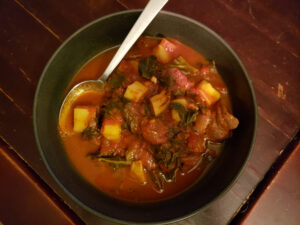 I love to cook. Taking ingredients and making them into a flavorful, nutritious meal is incredibly engaging for me. It requires me to sync my creativity, my problem-solving skills, and my ability to learn new things in order to produce something great. When I’m at my best, the thing produced is not only delicious, but also useful—combining homegrown foods, foraged foods, and whatever has been sitting in the fridge just this side of too long.
I love to cook. Taking ingredients and making them into a flavorful, nutritious meal is incredibly engaging for me. It requires me to sync my creativity, my problem-solving skills, and my ability to learn new things in order to produce something great. When I’m at my best, the thing produced is not only delicious, but also useful—combining homegrown foods, foraged foods, and whatever has been sitting in the fridge just this side of too long.
I can’t put this level of effort into every meal, though. I have limited wells of energy and motivation that sometimes must be dedicated to other pursuits (such as writing, gardening, maintaining social relationships, washing the dishes that result from the cooking, etc.) So it happens that my husband and I need to eat far more often than I am able to create a really lovely meal for us. At those times, rather than “cooking,” one or the other of us will do something I think of more as “preparing food.”
I grew up familiar with food prep short cuts. Both of my parents worked well over 40 hours each week, so “crafting” meals was not very high on their list of priorities. I’m not sure either really knew how to do more than the basics. My mother, who came from a family of 8 children, cooked most of our household’s meals. The recipes she carried over from her childhood seem designed with the intention of getting everyone fed as cheaply, quickly, and easily as possible. They involved a lot of casserole-like dishes flavored with pre-packaged seasoning mixes or cans of Campbell’s soup.
When I left home to live with my partner and attend college, I continued the tradition of making quick, easy, cheap foods that didn’t require much skill or creativity—things like Hamburger Helper or frozen, packaged meals. I didn’t start to learn how to really cook until I first lived alone in my mid-twenties. I suppose traveling, spending time with different kinds of people, and eating different kinds of food than I was previously exposed to brought up an interest in food that I hadn’t really had up to that point.
I gradually began to experiment with cooking and developed important skills like: comparing similar recipes to find the base requirements, learning to let a food’s own flavor shine through by cooking and seasoning minimally, and acquiring descriptors for spices like “earthiness” (i.e. cumin) and “heat” (i.e. cayenne). I signed up for a CSA and learned to cook produce I’d never eaten before. I watched my friends cook, asked them questions, and adopted their techniques. I failed a lot.
Eventually, I built up a strong enough base of knowledge that I didn’t need to rely so much on recipes, because I knew what each step was trying to achieve. Now I can make judgment calls about whether I will follow a recipe’s rules or not. I can substitute ingredients. I change a dish to make it spicier or creamier or vegetable-ier. I am amazed to have this ability, but I don’t have the energy to keep it active full-time, so I fall back on food shortcuts—lately, meal kits.
Meal kits are having a cultural moment right now in the United States. Others like me have come to appreciate the taste, affordability, and health benefits of home cooking, while being overwhelmed by the effort it requires. In many areas of our lives, it costs more to have less, so we work longer hours and have less time and energy for cooking. This is where the purveyors of meal kits step in, promising easy preparation, low creative investment, and an almost total elimination of food waste since they send only what you need—all for the low, low price of whatever special deal their latest influencer’s code will give you. It’s an appealing prospect, but one that I’m learning doesn’t work well for me personally.
For me, meal kits take all the fun and interesting parts out of cooking. Making judgment calls, swapping ingredients in and out, deciding at the last minute to adjust the seasoning, creatively shopping and planning multiple meals in advance—these are all the “hassles” that meal kits eliminate. They are designed to make it so that you don’t have to think about what to cook or how to cook it.
Chopping, mixing, sautéing, using twenty dishes and then having to clean them up afterwards—these are all the tedious bits of cooking that I could do without. The meal kit service we tried has not managed to consistently eliminate any of them. It’s as though they’ve reduced meal preparation to only its manual labor components. In my experience they haven’t been great time or money savers either. Meal prep takes 30 minutes to an hour for each meal, and we still grocery shop on a near weekly basis to replenish other staple items. Basically, as shortcuts go, they’re kind of terrible.
I also struggle with following a meal kit’s instructions, having become accustomed to only loosely paying attention to a recipe’s notes. As a result, my meal kit preparation is on average worse than my husband’s. (He always follows the instructions perfectly.) I’m finding that when I’m in the kitchen, I’m either inclined to cook something with all the creativity that entails, or I’m making frozen pizza or boxed macaroni and cheese.
In defense of these kits, every (correctly prepared) meal they’ve sent us has tasted good and included a balanced variety of ingredients. If the obstacles that most challenge you in meal preparation are related to creativity and decision fatigue, this style of shortcut may be exactly what you are looking for. I just happen to find creativity and decision making to be the fulfilling parts of cooking. Stripping them away makes me feel like I’m doing all the work with none of the reward.
Perhaps there’s a future out there in which we won’t all have to work so hard at everything else and can spend real quality time dedicated to the craft of cooking. Until that day, I’m choosing not to see it as a failing to rely on packaged foods when my energy runs low. I don’t have to go through the motions of cooking without the benefits just to feel like I’m eating something “home cooked.” I’ll use the energy I save to make garden-grown, backyard-foraged, last-bit-of-something-in-the-fridge masterpieces when I can manage it.

